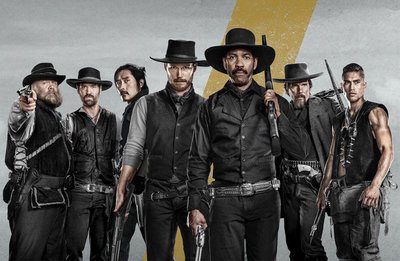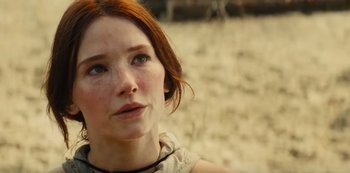
By Kate Hearst.
Antoine Fuqua’s The Magnificent Seven showcases a multiracial cast of personalities who collaborate to defeat a murderous robber baron on the American frontier. The overall cinematic spectacle of teamwork among this star-studded collection of lone gunslingers, led by Denzel Washington, is as deeply satisfying as the 1960 version about the combined efforts of American gunmen and Mexican farmers to defeat marauding bandits. Fuqua’s vision goes even further in transforming the earlier The Magnificent Seven to highlight current global issues and diversify a genre notoriously white and male.
The film opens with pastoral images of a western farming community ironically named Rose Creek, immediately interrupted by explosive panoramic scenes and sounds of a mountainside dynamited for the benefit of the Bogue Mining Company. The year is 1879, though it is not hard to be reminded of the current worldwide devastation of mountains for bloody nuggets of gold throughout Latin America, Africa, and Asia.
Gathered together in church, homesteaders discuss how their drinking water has been contaminated by the Bogue Mining Company, a reference to what homeowners from Flint, Michigan and through the south and west are experiencing as ruthless officials and fracking companies destroy the American landscape. These opening scenes have global reverberations as virtually all countries are forced today to participate in the economic rapaciousness that is destroying the earth.
The unscrupulous mine owner Bartholomew Bogue (Peter Sarsgaard), termed a “robber baron” (this dig at capitalism was impossible in Sixties Westerns) breaks up the church services to demonstrate to the homesteaders that their land is merely dust – but obvious gold to him. Fuqua sets the stage for a new kind of showdown where eventually homesteaders and exploited miners fight side by side against Bogue and his hired gunmen. It’s an effective reconfiguration of not only the 1960 version but Kurosawa’s 1954 Seven Samurai on which this film, like the original Western, is based. It is a strong rebuke of capitalism itself, as Donald Trump is taken seriously as a presidential candidate.
After witnessing her husband shot in cold blood by Bogue, heroine Emma Cullen (Haley Bennett) and friend Teddy Q (Luke Grimes) set out to find help in a nearby town. Meanwhile, Cullen and the audience watch the imposing bounty hunter Sam Chisolm (Denzel Washington) ride into town and effortlessly kill half a dozen men in a saloon in order to single out his legally sanctioned charge.
Cullen approaches Chisolm and persuasively recounts the plight of her small town. Moved by Cullen’s story, Chisolm agrees to help rid her community of the murderous Bogue. While it appears that Chisolm is acting out of the well-known western code of honor, it is later revealed that Chisolm had crossed paths with Bogue before, and wants revenge as much as righteousness. From his later tale, Chisolm and his freed family were evidently part of the migration to Kansas to escape the Black Codes permitted in the South during the resistance to Radical Reconstruction.
 In Fuqua’s film, Cullen holds a place of privilege, the pathfinder who hires the eclectic group of professional killers to defeat Bogue. Later, when townspeople ask who gave her permission to bring in the gunmen, she replies that she was the only one with “balls.” Strong female agency is refreshingly portrayed by Cullen, as she exercises the added character dimension of being a terrific marksman in her own right. Though surrounded by eligible gunmen, our heroine does not fall prey to love or even onscreen romance. She remains steadfast to saving her town from Bogue’s murderous grip. These gestures are fairly unique in a male-dominated genre.
In Fuqua’s film, Cullen holds a place of privilege, the pathfinder who hires the eclectic group of professional killers to defeat Bogue. Later, when townspeople ask who gave her permission to bring in the gunmen, she replies that she was the only one with “balls.” Strong female agency is refreshingly portrayed by Cullen, as she exercises the added character dimension of being a terrific marksman in her own right. Though surrounded by eligible gunmen, our heroine does not fall prey to love or even onscreen romance. She remains steadfast to saving her town from Bogue’s murderous grip. These gestures are fairly unique in a male-dominated genre.
Despite Cullen’s centrality, wisecracking male humor and physical entertainment abound as Chisolm gathers colorful personalities for the fight against Bogue. Chisolm’s gang of misfit sharpshooters includes: gambler Josh Faraday (Chris Pratt), traumatized former Confederate marksman Goodnight Robicheaux (Ethan Hawke) and his knife-throwing partner Billy Rocks (Byung-Hun Lee), Vasquez (Manuel Garcia-Rulfo), Jack Horne (Vincent D’Onofrio), and Red Harvest (Martin Sensmeier). These are different eccentric gunslingers from the ones in the 1960 version, but their traits have roots in the original, from death-weary cowardice in one man to samurai skills in another. Faraday humors the audience with silly magic tricks, as he escapes two men with their guns trained on him at close range. He is a rough correlate to the comical Steve McQueen character in the 1960 film. While Fuqua offers original touches, he borrows a great deal.
The knife-throwing Billy Rocks and Civil War veteran Goodnight Robicheaux are most derivative of the 1960 version. However, in this Magnificent Seven, it’s the talented North Korean star Byung-hun Lee as Rocks who charms with his knives, and the gifted Ethan Hawk who poignantly plays the traumatized marksman. Fuqua’s film introduces several new personalities, not seen in 1960: “Mexican Bandit” Vasquez, tracker/scalper Jack Horne and outcast Comanche warrior Red Harvest (played by native American actor Sensmeier). While Hollywood’s casting decisions are clearly made to reach international markets, the authentic diversity of this dynamic posse enhances the screen experience for all audiences.
This film provides a contemporary twist to the 1960 film by having Chisolm and his men invade the mining camp to free the miners and steal the dynamite. Ultimately, the showdown involves miners fighting side-by-side with homesteaders, and Bogue’s army of hired gunmen being blown to smithereens as dynamite explodes everywhere. The movie gives us a display of solidarity once fairly common to Hollywood genres but rare today, making Fuqua’s accomplishment especially vital.
 As first demonstrated on the L.A. streets of Training Day (2001), dramatic tension and grueling action are the major arrows in Fuqua’s quiver. Fuqua contrasts the new with the old, as the Seven fight with rifles, knives, axes, and bow and arrow. But the most significant contrast is Cullen, shooting with a marksman accuracy alongside her male compatriots.
As first demonstrated on the L.A. streets of Training Day (2001), dramatic tension and grueling action are the major arrows in Fuqua’s quiver. Fuqua contrasts the new with the old, as the Seven fight with rifles, knives, axes, and bow and arrow. But the most significant contrast is Cullen, shooting with a marksman accuracy alongside her male compatriots.
The final showdown between Bogue and Chisolm is inside a burned out church. It is a dramatic moment that shifts the film from personal sacrifice to revenge fable that nods to the devastation of slavery, the Civil War, and its aftermath. The scene is concluded by Cullen’s intervention, suggesting the hero is too emotional and caught up in events to see the real dangers of the past in the present.
As a visual experience, Fuqua’s location photography in Louisiana, Arizona, and New Mexico is handily used. The musical score by the late James Horner enhances the spectacle of this western with its subtle brass motifs. Of course, as end credits roll, audiences are reminded of the brilliant and unmatched main theme created by Elmer Bernstein for the 1960 version.
Antoine Fuqua’s The Magnificent Seven, written by Nic Pizzolatto and Richard Wenk, is no simple action-driven western. While it provides generic entertainment with all the humorous bells and violent whistles expected from a western, Fuqua’s cinema functions on a mythic level. The final images of a black man, a Native American, and a Latino riding into the sunset is a needed tonic, and a special consolation after the battle is over. Three men of different races riding off together should be common in this day and age, but it isn’t. Society has not yet enjoyed that level of compassion and camaraderie. As tracker Jack Horne remarks, “To be in the service of others with men I respect, I shouldn’t have to ask for more than that.” Audiences need not ask for more in Fuqua’s action film that satisfies not only the thrills expected from a western, but also the utopian subtext of multiculturalism in its quest to defeat ruthless and powerful business interests.
Kate Hearst teaches film history at Brooklyn College of the City University of New York and is writing a book on the films of Barbara Kopple.
